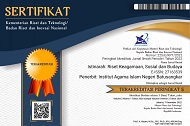Tradisi Mambukak Kapalo Banda dalam Kajian Living Qur’an
Abstract
Keywords
Full Text:
PDF (Bahasa Indonesia)References
Afrizal. (05 Juli 2021). Duo Koto.
Ahimsa, H. S. (2012). The Living Al-Qur’an : Beberapa Perspektif Antropologi. Jurnal Walisongo.
Amalo, C. (02 Juli 2021). Duo Koto.
Batuah, U. D. (08 Juli 2021). Duo Koto.
Hafizah, R., & Bustamam, R. (2021). Pemahaman Imam Al-Qurthubi Terhadap Konsep Riddah dalam Al-Qur’an dan Relevansinya dengan Indonesia. Istinarah: Riset Keagamaan, Sosial dan Budaya, 3(1), 1-21.
Hasbillah, A. ‘. (2019). Ilmu Living Qur’an-Hadis. Ciputat: Maktabah Darus Sunnah.
Mustafa, I., & Ridwan, R. (2021). Tradisi Syaraful Anam dalam Kajian Living Hadis. Istinarah: Riset Keagamaan, Sosial dan Budaya, 3(1), 76-87.
M.Suwir. (29 Juni 2021). Duo Koto Malalo.
Nagari, W. (10 Juli 2021). Profil Nagari Guguak Malao.
Putri, M. E., Satriadi, I., & Hasibuan, U. K. (2019). Godaan Setan dan Cara Mengatasinya Menurut Al-Quran. Istinarah: Riset Keagamaan, Sosial dan Budaya, 1(1), 16-30.
Sofian, M., Syamsuwir, S., & Amril, D. (2020). Penafsiran Ayat-Ayat Zakat Oleh Maulana Muhammad Zakariyya Al-Kandahlawi dalam Buku Fadhilah Sedekah. Istinarah: Riset Keagamaan, Sosial dan Budaya, 1(2), 55.
Suwir, M. (29 Juni 2021). Duo Koto.
Taufik. (03 Juli 2021). Duo Koto.
DOI: http://dx.doi.org/10.31958/istinarah.v3i2.4532
Refbacks
- There are currently no refbacks.
Copyright (c) 2021 ELSI NOVITA SARI

This work is licensed under a Creative Commons Attribution-NonCommercial 4.0 International License.
Istinarah: Riset Keagamaan, Sosial dan Budaya
Indexed By:
Istinarah: Riset Keagamaan, Sosial dan Budaya distribute under Lisensi Creative Commons Atribusi-NonKomersial 4.0 Internasional









_.png)









